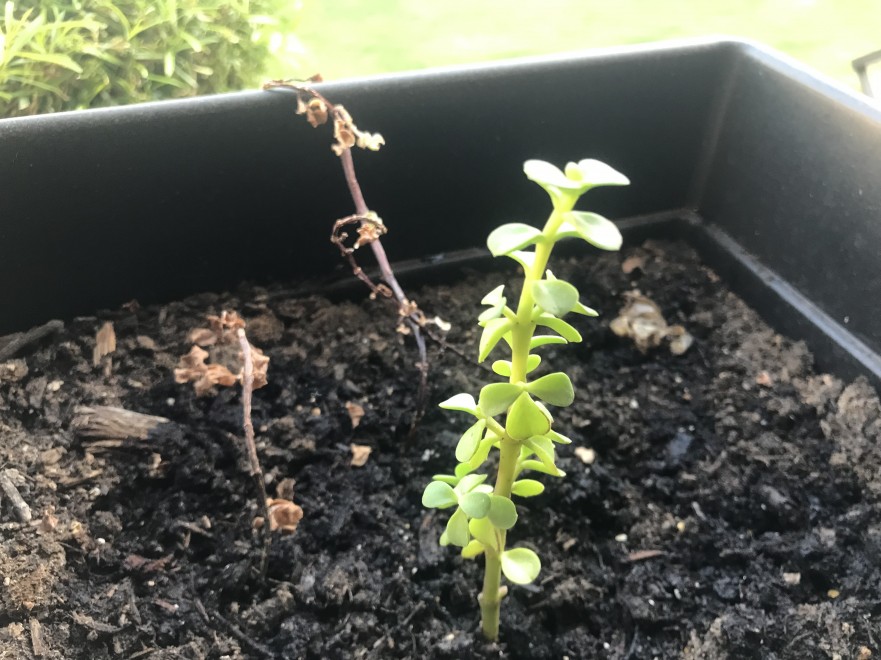In order to water plants on my patio I must complete the following steps:
- Fill a cup with water in kitchen sink
- Walk to patio door
- Move sliding blinds
- Unlock sliding door
- Open sliding door
- Open screen door
- Step outside
- Water the plant
And don’t even get me started that I occasionally get paralyzed on step 1 or 7. First, I internally debate whether getting a clean cup out for this chore will mean I need to or should wash it, and on the seventh step I sometimes give up because I don’t want to step onto the dusty patio and track a mess into my clean living room.
Suffice to say, plants die on my patio.
I sit on my couch, think about all 8 steps and the other paralyzing thoughts, and it doesn’t happen. I know there are many of you who would say “no, thats 1 chore: water the plants” and the 8 steps are not individual feats; however, that is not how my brain works, and it never has.
In my assessment as a WebMD specialist, I’d say this brain function is an aspect of anxiety, but if I am mislabeling or misattributing this phenomenon, I apologize.
My point is: I, a college-educated adult, tend to not complete tasks that are simple, or could bring me joy because of a slight inconvenience or perception of a barrier. And learning this about myself has shaped me as a high school educator.
I know that there are students out there with all sorts of barriers to education. From obligations to family or jobs, to limited access to resources, to invisible and yet-to-be-diagnosed mental obstacles, the roadblocks are numerous. Students can often articulate when they had to babysit for their parents, or they can explain that they need an after-school job to help pay bills. But, they are not always able to explain why they procrastinate or simply “blow off” school work. Of course there are students who simply prefer socializing, sports, or binging shows, but there are students who are deterred from completion and haven’t developed the discipline to overcome their barriers. This knowledge informs my approach in a few ways, but, chief-among-them, is two key strategies.
- I must work double-time to identify and eliminate barriers for my students. Reduce excuses. Make things easier. This requires a lot of focus, and it requires regular reflection. It also can vary year to year or from student to student.
- Forgive and accept students. Often, I have to be the one to pull the student aside and ask about the missing or incomplete work. Many will keep their head down embarrassed that they cannot articulate their excuse, or think they don’t have one.
Many of us know the barriers our students face and we reflect about making things efficient every year.
I wonder how many teachers forgive and accept students though? This is a hard one for me. My natural approach is “if I can work hard, so can you.” But I have evolved since my first semester.
Early in the year, I have many students with zeros on things. And while I have official policies in place to account for late work, I assure you I will proactively be remedying these holes with many of my students. In conversations with students, I accept the students for who they are, and invite them to try again or just do their best. I also sometimes discover barriers that I can fix, and it helps many students in the future. A student with a zero on a heavily weighted writing assignment in the third week of school will not fail my class regardless of the quality of their excuse or lack thereof. We will talk about it, I will encourage them to do the work, and they will be a better student for it. I am not talking about giving away free points to students who refuse to do the work, I am talking about helping the students overwhelmed by the class, school, home-life, or content. They don’t need to articulate an excuse, they may not be old enough to do self-psychoanalysis nor have they even met with specialists or doctors to help them.
There are people who cannot relate to my list of 8 obstacles to watering a plant. That’s ok. It’s real to me, and I’ve learned about consequences and accountability enough to function in the world, despite this affliction. When I neglect social, familiar, or work commitments for no discernable reason, I feel like I let myself down. I appreciate when friends, family, and colleagues seem to understand, and it stings even more when I am chastised. I am diligent about improving, and concerned about doing right by others, but I know there are lapses.
I never want to exacerbate the anguish of a student by stinging them with a harsh critique. I want to embrace their unique way of working, value their contributions, and help them clear the hurdles they will face in high school and beyond.
So, yes, I have plants die on my patio. But right now, today, in the same pot where four other plants have withered and died, I have a healthy young succulent that greets me every day. I’m not gonna give up on him, and I hope my students won’t give up on me either.










Comments 2
Hi!
The word that comes to mind is grace. We must give ourselves and our students grace. I want to hold true and strong to my no late work policy. But there are times when I have to bend the rules. We aren’t perfect and neither are our kids. While I want to teach them to plan, manage their time, and take the work seriously, life happens. Thank you for reminding us of that.
This is an honest and beautiful post, James. I really enjoy hearing how your reflections lead you to be such a caring and nurturing educator.